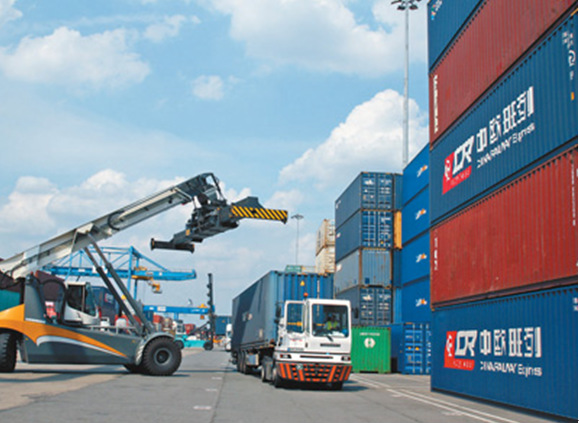


Workers load and unload containers at the Duisburg Port, Duisburg.
(Photo by Guan Kejiang from People’s Daily)
The Duisburg Port, the world’s biggest inland port located in western Germany, has thrived thanks to the “Belt and Road” initiative as the port, over the past years, has ascended to one of the key stops in Western Europe for the China-Europe freight train service.
Located in the North Rhine-Westphalia, a state in western Germany, the port is an important transportation and logistics hub in Europe.
Ralph Meurer, general manager of the Economic Promotion Bureau of Duisburg, said the China-Europe freight train service is “definitely a key of good luck that has the potential capacity to turn Duisburg into a China-Germany trade center”.
As of this May, more than 4,000 cargo train trips had been made between Chinese and European cities. Departing from 28 cities in China, the freight trains travel to 29 cities in 11 European countries.
In 2016, more than 1,700 cargo train trips were made between Chinese and European cities, over 1,000 among which were between China and Germany. The freight train service is transporting a rising number of commodities between China and Germany, as well as between China and Europe.
As an important stop along the rail corridor connecting China and Europe, Duisburg is a stopover city for over 20 trains every week. Now, the China-Europe freight train service is contributing 20 percent of Duisburg’s total business turnover. Last year, Duisburg set a record for being the only port in Germany that did not suffer from a loss and made profits.
The Chongqing-Xinjiang-Europe Railway that reaches Duisburg is the earliest line to come into service. So far, 1,100 trains have been running along the route, the largest number compared with other lines linking China and Europe.
It takes 12 days to travel 11,000 kilometers through the route after the trains leave Chongqing for the terminal in Duisburg, 30-plus days less than river-ocean transportation. The cost is only one fifth of that by air.
The success of the rail line well reflects the close China-Germany cooperation, said Li Shuqiu, Director of European Liaison Office of Chongqing Economic and Information Commission, adding that the Chongqing-Xinjiang-Europe freight train service has presented four characteristics in its development.
The first one is the increase of trains and decrease of empty containers. The number of trains returning to China added to 150 in 2016 from 22 in 2014, Li pointed out.
In addition, the supply of goods has been enriched and the range of services has been expanded, with nearly 100 brands are being transported along the route, according to the director.
The freight train service is covering more markets, with more than 10 countries in western and eastern Europe benefiting from the service last year, Li added.
Taking the opportunities brought by the route, lots of related businesses have emerged. China’s e-commerce companies, for instance, have set up their purchasing centers near Duisburg.
Thanks to the line, Chongqing, an inland city far from the ocean and doesn’t produce any coffee beans, has opened the world’s third-largest coffee trading center and is working to build a network that combines a variety of transportation means.
The China-Europe train service is making its due contribution to facilitate the opening up of inland Chinese cities and the development of an open economy in China.
The construction of the Silk Road Economic Belt has genuinely benefited Germany. An estimated 45,000 jobs in Duisburg are directly or indirectly related to the development of the Duisburg Port, 26,000 more than that in 2000.
Realizing the broad prospect brought by the Belt and Road construction, the Rheinische Post once published an article titled “The Belt and Road Initiative is an employment engine in Rhein.”
 Fire brigade in Shanghai holds group wedding
Fire brigade in Shanghai holds group wedding Tourists enjoy ice sculptures in Datan Town, north China
Tourists enjoy ice sculptures in Datan Town, north China Sunset scenery of Dayan Pagoda in Xi'an
Sunset scenery of Dayan Pagoda in Xi'an Tourists have fun at scenic spot in Nanlong Town, NW China
Tourists have fun at scenic spot in Nanlong Town, NW China Harbin attracts tourists by making best use of ice in winter
Harbin attracts tourists by making best use of ice in winter In pics: FIS Alpine Ski Women's World Cup Slalom
In pics: FIS Alpine Ski Women's World Cup Slalom Black-necked cranes rest at reservoir in Lhunzhub County, Lhasa
Black-necked cranes rest at reservoir in Lhunzhub County, Lhasa China's FAST telescope will be available to foreign scientists in April
China's FAST telescope will be available to foreign scientists in April "She power" plays indispensable role in poverty alleviation
"She power" plays indispensable role in poverty alleviation Top 10 world news events of People's Daily in 2020
Top 10 world news events of People's Daily in 2020 Top 10 China news events of People's Daily in 2020
Top 10 China news events of People's Daily in 2020 Top 10 media buzzwords of 2020
Top 10 media buzzwords of 2020 Year-ender:10 major tourism stories of 2020
Year-ender:10 major tourism stories of 2020 No interference in Venezuelan issues
No interference in Venezuelan issues
 Biz prepares for trade spat
Biz prepares for trade spat
 Broadcasting Continent
Broadcasting Continent Australia wins Chinese CEOs as US loses
Australia wins Chinese CEOs as US loses